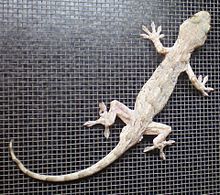Schlegel's Japanese gecko (Gekko japonicus), also known as yamori in Japanese, is a species of gecko.
| Schlegel's Japanese gecko | |
|---|---|

| |
| Scientific classification | |
| Domain: | Eukaryota |
| Kingdom: | Animalia |
| Phylum: | Chordata |
| Class: | Reptilia |
| Order: | Squamata |
| Family: | Gekkonidae |
| Genus: | Gekko |
| Species: | G. japonicus
|
| Binomial name | |
| Gekko japonicus (Schlegel, 1836)
| |
| Synonyms | |
| |
Taxonomy
editG. japonicus was classified by Hermann Schlegel in 1836. The specific epithet, japonicus, is Modern Latin for Japan.
Distribution
editGekko japonicus occurs across the main islands of Japan, ranging from northern Honshu in the north and east to Kyushu in the south and west. It can also be found in eastern China and in South Korea.[1]
Ecology
editLike other species of gecko, individuals of G. japonicus primarily eat insects. The species is capable of autotomy, and will separate its tail from its body to escape predators. While this process avoids bleeding, as blood vessels at the base of the tail close to prevent blood loss, the gecko does lose a supply of fat tissue, which it can use during periods where food is scarce.[2]
Japanese culture
editIn Japanese culture, seeing a gecko on one's home is associated with good luck. The animal's name, yamori, translates to home-protector.
References
edit- ^ Gekko japonicus at the Reptarium.cz Reptile Database
- ^ Hooper, Rowan (2001-06-08). "Gecko". The Japan Times. Retrieved 2022-05-20.